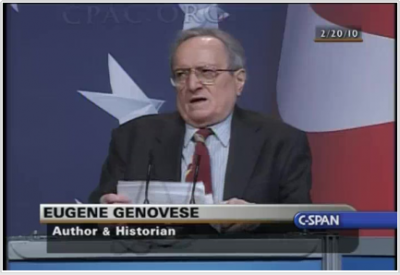In 2017, Douglas Ambrose, Charter Fellow of the Alexander Hamilton Institute for the Study of Western Civilization (AHI) published the The Sweetness of Life: Southern Planters at Home, the unfinished manuscript of Eugene D. Genovese (1930-2012), one of the most influential and controversial historians of his generation. In a recent review of the book in The Times Literary Supplement, the author called Genovese a “giant in the field of American history.” Douglas R. Egerton of Le Moyne College, winner of the 2017 Gilder-Lehrman Lincoln Prize, said of Genovese recently, “No historian played a larger role in recovering the complicated, turbulent world of antebellum cotton slavery.” Genovese’s masterpiece Roll, Jordan Roll: The World the Slaves Made (1974) figures on most lists of the most important works of non-fiction of the twentieth century.
Both Ambrose and AHI Executive Director Robert Paquette studied under Genovese, and he bequeathed to AHI his great collection of books on southern history and culture. Although Genovese destroyed much of his personal correspondence before his death, the bequeathed collection also included—unexpectedly— multiple boxes of letters and other documents. AHI began cataloguing these materials several years ago. The catalogues are now complete and available online.
The Genovese collection contains more than 3,000 volumes. AHI commissioned Christian Goodwillie, Director of Special Collections and Archives at Hamilton College, to catalogue all published items in the collection. He created two lists: one by title and publication information as well as a second annotated list for the benefit of researchers.
Phase two of the project involved sorting and cataloguing the multiple boxes of documents, most of them related to his tenure as president in the 1990s of The Historical Society. This work was completed by Antonia Ambrose, a sophomore at the University of Notre Dame. She is daughter of Douglas Ambrose and Sheila O’Connor-Ambrose, who studied under Genovese’s late wife, Elizabeth Fox-Genovese (1941-2007), a prominent intellectual in her own right.
Antonia Ambrose acquired her cataloguing skills working for two summers as an intern for Mr. Goodwillie. For her, the project was a labor of love. She knew Genovese as a close family friend and as a mentor to both her parents. Although certainly aware of Genovese’s stature as a scholar and teacher while growing up, she found that the documentary materials “expanded the context” of the man she knew lovingly as “Papa Gene.” “He was a warm and loving presence in our lives,” she recalled, “so it’s been special for me to work on these papers. Although many of them shed interesting light onto some of Gene’s professional activities–the creation of The Historical Society, the editing and publication of various essays, his generous responses to scholars seeking his advice–some of them also reveal the more playful personality I knew. I always loved visiting Gene and Betsey, and working on this project has given me a chance to revisit that, reminding me how great an honor it was to know them.”
“Gene and Betsey modeled for me what the life of the mind ought to be,” Douglas Ambrose observed. “Their inquisitiveness, their recognition that truth could be found in unexpected places, and their commitment to the close reading of texts continue to inspire and guide me. Gene and Betsey not only wrote great books, they read others’ books with care and insight. Having the Genovese book collection housed at the AHI is a great honor, and I look forward to sharing with my own students what a well-read book looks like. To browse the books they read and, especially, to see their marginal notations remind me of how blessed I was to be trained by them.”
“I owe Gene and Betsey Genovese,” said Paquette, “more than I can ever repay. It was in their home in Ithaca, New York, that I spent one of the most memorable years of my life, learning from them what it meant and what it takes to be a serious scholar. That AHI has undertaken and completed this important project brings me no small measure of satisfaction. A space in AHI headquarters, currently nearing the end of renovation, will serve as a special reading room bearing their names.”

Great presentation Dave !